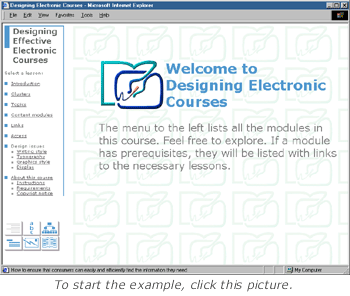 Designing Electronic Courses is an example of an early e-learning project. It is a better case study than exemplar as it shows both the potential and limitations of Web technologies for training.
Designing Electronic Courses is an example of an early e-learning project. It is a better case study than exemplar as it shows both the potential and limitations of Web technologies for training.
Context
This course was developed as part of a training initiative of the Foundation for Knowledge and Competence Development (Stiftelsen för Kunskaps och Kompetensutveckling) aimed at preparing over a hundred Swedish university professors and industry professionals to begin offering electronic courses, primarily over the Internet. The training consisted of this course, sandwiched between a couple of 2-day classroom sessions.
Caveats
We do not put this course forward as a model of excellent e-learning design—certainly not by today’s standards. We do think it is a good example of what can be done under some stringent limitations, like the ones you face on real projects. Limitations included:
- Technologies available in 1997. Robust authoring tools were scarce.
- Limited time. This entire course had to be created by 4 people working part time over a couple of months.
- Because the course had to work from CD-ROM as well as from a server, collaborative activities were all but eliminated.
What’s different
The course you experience here is almost identical to the one used in 1997. We have made just a few minor changes to make it more readily accessible and to avoid copyright problems.
- PowerPoint animations were converted to Flash animations which should play OK on Macintosh and Linux systems, rather than just Windows systems.
- Links to proprietary or restricted materials have been removed. Nothing crucial.
- Feedback links have been re-aimed at William Horton Consulting, so somebody gets your feedback.